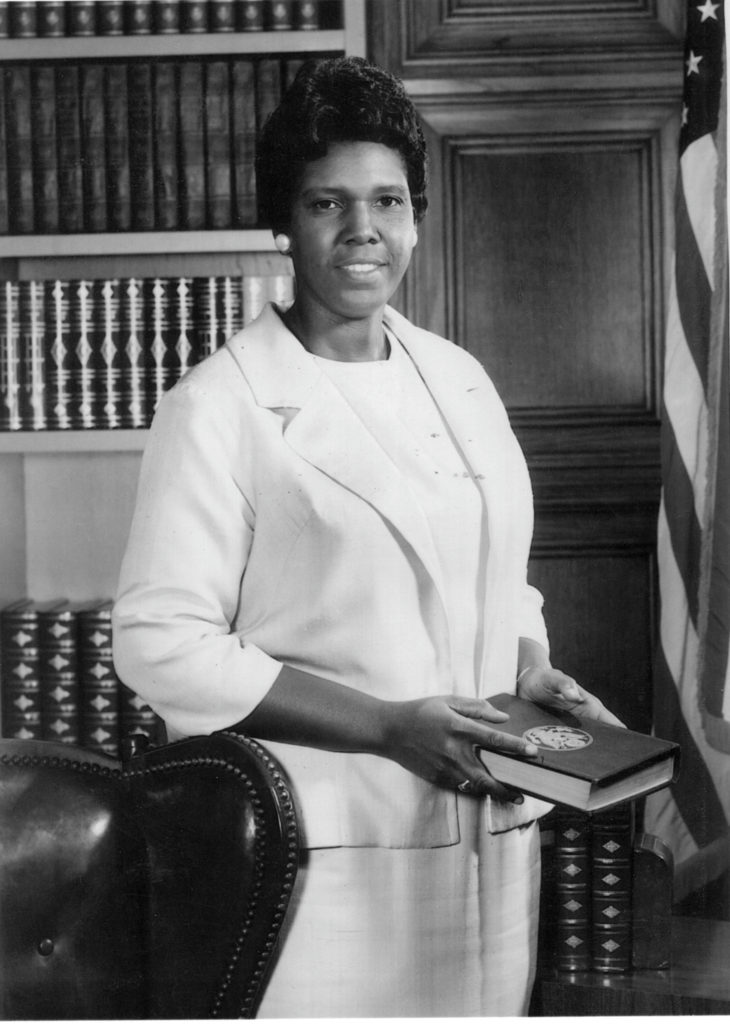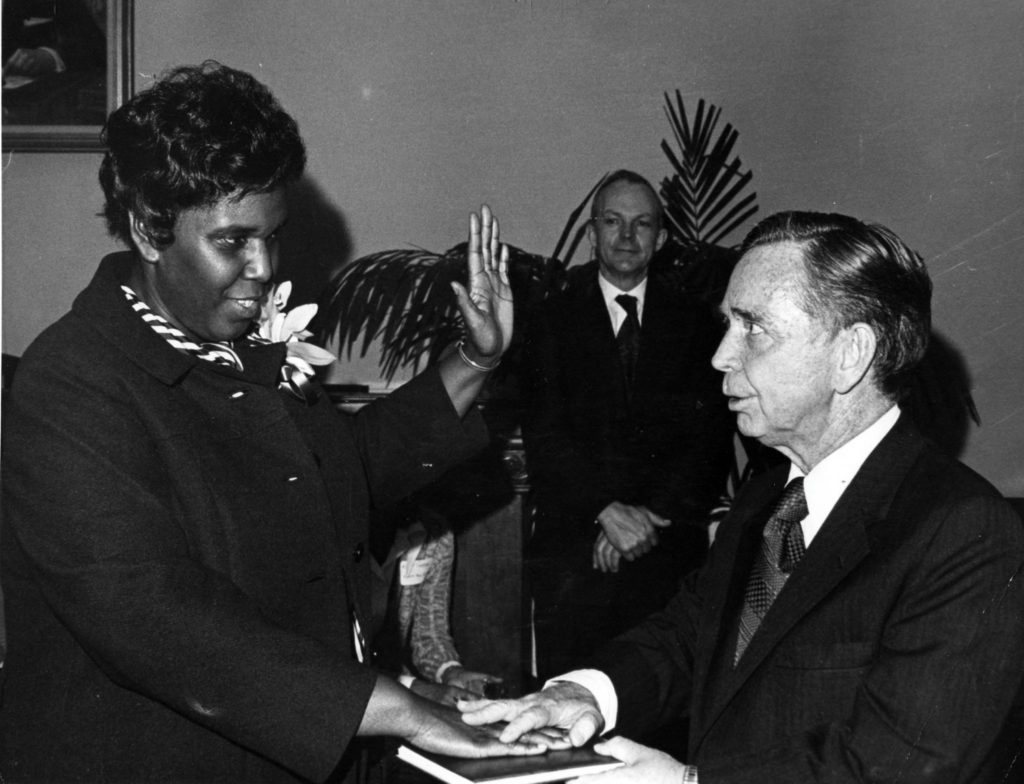Women of the CBC: Barbara C. Jordan
Discover the ways in which women of the CBC have shaped United States history.

Rep. Barbara Jordan (D-TX)
Representative of the 18th Congressional District of Texas from January 3, 1973 to January 2, 1979 (93rd-95th Congresses) First black Member of Congress from Texas.
Rep. Barbara C. Jordan (D-TX) is best remembered for her defense of the Constitution during the impeachment hearings of President Richard Nixon in 1974. Jordan’s reputation as a national leader was heightened by her involvement in the House Judiciary Committee and the hearings that resulted in the impeachment of President Richard Nixon. However, Jordan’s political career spans several decades and includes service in the Texas Senate, the House of Representatives and as a presidential and gubernatorial adviser. Jordan’s career demonstrates her commitment to fairness and to legislation that protects the underserved and underrepresented populations of the United States.
Barbara C. Jordan was born on February 21, 1936 in Houston, Texas. Following her graduation from Texas Southern University in 1956, Jordan went on to Boston University Law School where she graduated in 1959. Jordan’s political involvement began in 1960 when she became active in the Kennedy/Johnson presidential campaign. Six years later in 1966, Jordan became the first African American woman to be elected to the Texas State Senate where she served from 1966-1972.
Jordan’s tenure in the Texas Senate was notable. She was the first African American to chair a majority committee when she became chair of the Labor and Management Relations in the Texas Senate. As a senator, she sponsored Workman’s Compensation Act, which increased the maximum benefits paid to injured workers. In March of 1972, Jordan was unanimously elected president pro tempore of the Texas Legislature.
Rep. Jordan’s Congressional career began in 1972 with her election as a representative of Houston’s 18th Ward in the United States House of Representatives. She served as a representative from January 3, 1973 to January 3, 1979 (93rd-95th Congresses). Rep. Jordan was the first African American person to represent Texas and the first African American woman to represent a southern state in the United States House of Representatives. Her committee assignments included the Judiciary and Government Operations Committees. In 1974, Jordan served on the influential House Judiciary Committee during the Nixon impeachment hearings. As a result of her landmark statements in defense of the Constitution, the American public recognized her legislative leadership. Jordan’s leadership in Congress included her sponsorship of legislation to renew and expand the Voting Rights Act and the Community Reinvestment Act of 1977 as well as legislation that required banks to lend and make services available to underserved poor and minority communities.
In 1976, Barbara Jordan became the first woman and first African American to give the keynote speech at the Democratic National Convention. In 1979, she retired from her career as a public servant and returned to Texas as a full professor at the Lyndon B. Johnson School of Public Affairs at the University of Texas. Although retired, she remained heavily involved in politics. In 1987, she spoke out against the Supreme Court nominee Robert Bork. In 1992, she was asked to be keynote speaker again at the Democratic National Convention. Jordan also chaired a congressional commission that advocated increased restriction of immigration and increased penalties on employers that violated US immigration regulations in 1995.
Rep. Barbara Jordan was first diagnosed with Multiple Sclerosis in the early 1970’s. On January 17, 1996, she died of complications from pneumonia. Jordan laid in state at the Lyndon B. Johnson Library on the campus of The University of Texas at Austin for a public goodbye. Her papers are housed at the Barbara Jordan Archives at her alma mater, Texas Southern University.
Barbara C. Jordan Timeline
February 21, 1936 Born Barbara Charline Jordan in Houston Texas to Rev. Benjamin M. Jordan and Arlyne (Patten) Jordan
1956 Graduated magna cum laude from Texas Southern University
1959 Graduated from Boston University Law School
1959 Taught political science at Tuskegee Institute
1960 Worked on the Kennedy-Johnson campaign
1962, 1964 Ran unsuccessfully for election to the Texas House of Delegates
1966 Elected to the Texas Senate becoming the first African American state senator since 1883
March 21, 1967 Became the first Black elected official to preside over the Texas Senate. She was the first Black state senator to chair a major committee, Labor and Management Relations, and the first freshman senator ever named to the Texas Legislative Council.
March 1972 Became the first African American female to serve as president pro tem of the state senate
June 1972 Served for one day as acting governor of Texas
1972 Elected to the United States House of Representatives for Houston’s 18th district, becoming the first black woman from a Southern state to serve in the House.
1974 Made the historic speech before the House Judiciary Committee supporting the impeachment of President Richard Nixon.
1976 Made the historic keynote address at the Democratic National Convention
1976 Sponsored legislation to broaden the Voting Rights Act of 1965 to cover Mexican Americans in Texas and other southwestern states and to extend its authority to those states where minorities had been denied the right to vote or had had their rights restricted by unfair registration practices, such as literacy tests.
1977 Sponsored the Community Reinvestment Act of 1977, legislation that required banks to lend and make services available to underserved poor and minority communities.
1979 Retired from politics in 1979 and became a professor at the University of Texas at Austin Lyndon B. Johnson School of Public Affairs.
1992 She again was a keynote speaker at the Democratic National Convention.
1995 Chaired a congressional commission that advocated increased restriction of immigration and increased penalties on employers that violated US immigration regulations
1995 Awarded the prestigious United States Military Academy’s Sylvanus Thayer Award.
January 17, 1996 Died



